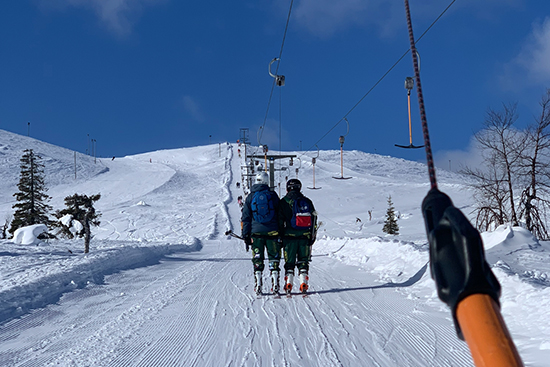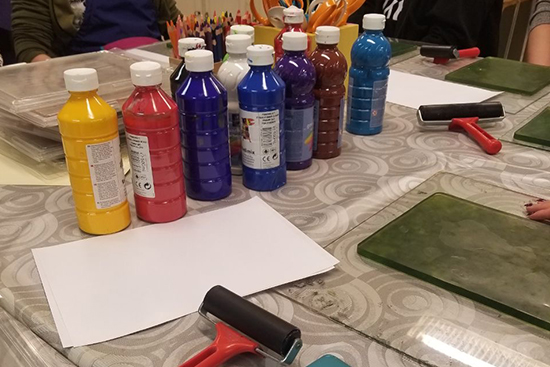In the spring of 2025, a new event format was introduced – theatre. The YTK students went to see the Keuhkot (Lungs) play at the Rovaniemi Theatre. Photo: Inari Turkia
For a few academic years, the subject associations of the Faculty of Social Sciences have planned joint culture and sports events that have been organised with the faculty’s help. This spring, feedback was collected from students participating in these events, and it proved to be excellent. Consequently, new ideas for joint events sprouted from the feedback.
Text: Marjo Laukkanen
Photos: Siiri Kujala and Inari Turkia
The joint events organised by the subject associations of the Faculty of Social Sciences (YTK), have aimed at strengthening the students’ sense of togetherness, community and well-being.
“The events are arranged by all YTK subject associations for all YTK students”, says Inari Turkia, Chair of Kosmos Buran.
The faculty has four subject associations: Jalot Villit for students of tourism research, Kosmos Buran for students of sociology and political sciences, Lyhty for students of social work and Remburssi for students of administrative sciences, management and leadership psychology.
Usually, subject associations organise events only for their own members. Doing something new together has been rewarding in many ways.
“We have been able to meet new people. This increases the sense of community for sure”, says Turkia.
“Joint events have brought us students together as a faculty”, adds Siiri Kujala, Chair of Lyhty.
Combining strengths has been worthwhile, as more participants have found their way to the culture and sports activities. These types of events are typically much less popular compared to parties.
“Together it is possible to create bigger and more prominent events”, says Kujala.
What is most important about these kinds of activities?
“That we have as wide a range of low-threshold events as possible. Something for everyone”, responds Kujala.
“That everyone feels welcome and is able to enjoy themselves”, adds Turkia.

One of the traditional joint events organised by subject associations is a day trip to Levi. Photo: Inari Turkia
Something extra on a large scale
The joint events have included movies, sports, arts and day trips for example to Levi, among other things. The small-scale financial aid, as described by the faculty, has been worth 1000 euros per subject association, totalling 4000 euros per academic year.
“This is a lot of money for us, and it wouldn’t have been possible to arrange these events without it. We have wanted to offer the students something extra that they otherwise might not be able to afford”, says Kujala.
The event turnout depends on the event. For example, the number of students who could join the spring-winter trip to Levi was limited by the number of seats on the bus. For movies and theatre experiences, whole halls have been booked exclusively for the students.
For each event, each of the subject associations have been allocated a certain number of tickets for sale to ensure students from different fields can participate. The participants only pay a small amount for the tickets, usually a couple of euros, five at most.
“We have tried to get students to commit to these events with the prices. A free movie ticket would be easy to grab even if the student didn’t make it to the movie in the end”, notes Kujala.
The tickets have been cheaper than the ones to the faculty’s own events.
“The intention is to offer students culture and sports activities at a feasible price with the faculty’s support, so that all willing people have a chance to participate”, says Turkia.

In the autumn of 2024, an arts event was held in Korundi House of Culture, where the students’ creativity blossomed. Photo: Siiri Kujala
Some of the events are completely free, such as the Christmas card workshop where the participants craft cards to take them to nursing homes, for instance. The materials for the cards and a bit of snacks are bought with the faculty’s support.
During the academic year, around eight joint events have been arranged, some of them bigger and some smaller. The day trip to Levi, Christmas card workshop and movies have already become established events. In addition, the associations try to arrange something new each academic year.
One suggestion collected from the feedback was a game called Kaupunkisota (“City war”). It is a sports game played indoors in a sports hall where two teams build a city with PE lesson equipment, resulting in a game that combines obstacle courses, dodgeball and capture the flag. Some people also suggested hangouts together where the most important part is to get to know each other.
“By trying different things, we get to know what works and what is worth arranging a second time.”